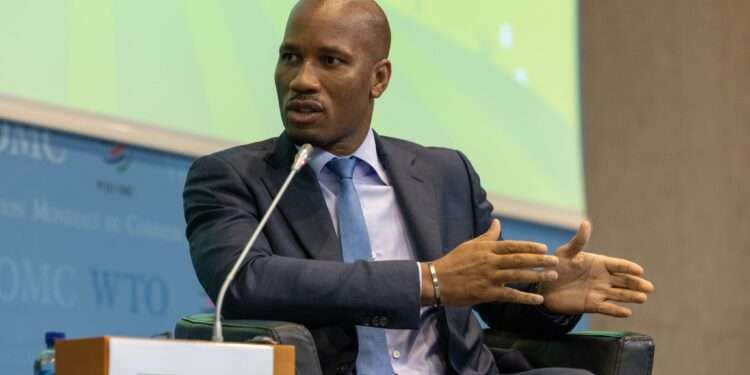Football teaches people to live together – Didier Drogba says
“Football isn’t just about winning or losing, football is also about being a good person, learning how to live together, in a team full of different nationalities,” Drogba said. “For example, at Chelsea, I was playing with Russians, Ukrainians, Germans, Ivorians, Ghanaians and we had to learn how to live together, to respect each other’s culture and play for the same badge. These are the values that you win and you learn when you play football. This is something all the kids should have.”
- Advertisement -
FIFA Legend and the World Health Organization’s Goodwill Ambassador for Sport and Health Didier Drogba has spoken about football’s power to teach people from different backgrounds how to live together, the growth of women’s football and the need to create more opportunities for players in Africa.
The former Côte d’Ivoire and Chelsea forward was appearing alongside HRH Princess Reem Bint Abdullah Bin Mosaad Al Saud of the Kingdom of Saudi Arabia at the Making Trade Score for Women! event which was held at the World Trade Organization (WTO) in Geneva, Switzerland.
- Advertisement -
“Football isn’t just about winning or losing, football is also about being a good person, learning how to live together, in a team full of different nationalities,” Drogba said. “For example, at Chelsea, I was playing with Russians, Ukrainians, Germans, Ivorians, Ghanaians and we had to learn how to live together, to respect each other’s culture and play for the same badge. These are the values that you win and you learn when you play football. This is something all the kids should have.”
Turning to football in Africa, he spoke of the need to create the right conditions for players to develop. “I think we need to create opportunities in Africa, on the continent, give opportunities to kids, to have youth leagues,” Drogba said. “If you want to become a superstar, there are some stages of practice that you need to learn, and we don’t have that.”
- Advertisement -
He said that the African Super League, which is set to kick off later this year, would be a great opportunity for the continent to develop infrastructure and praised the FIFA President Gianni Infantino for altering perceptions of African football. “Since his election, he really changed the way we see football in Africa…Now, we see the economics, the development in terms of investments for companies into football.”
With the FIFA Women’s World Cup Australia and New Zealand 2023 less than three months away, Didier Drogba praised the standard of women’s football.
- Advertisement -
“I played with great players, in great teams, but I could see some of these women players being in our squad and performing and competing with the boys,” he said. “You know, when I watch the game, I see the way they touch the ball. You know, the first touch is so important when you play football, and trust me, even I missed some of my first touches, but they’re so focused on it, and they make it a better, more beautiful game to watch.”
Saudi Arabia recently launched its first women’s football league and the women’s national team played their first matches in 2022, and Princess Reem spoke about the rapid growth of the sport in the kingdom.
“The government has made a tremendous effort in supporting us, whether it’s organising leagues, forming a national team, having multiple programmes for Saudi men and women to grow the sport, so this is an exciting time,” said Princess Reem. “We are in a very important stage in our development. I know that it takes a lot of time, work, patience, and experience to do what the men’s team did, but hopefully I’m sure we’ll be able to make our country proud.”
Saudi Arabia’s women’s national team played their first-ever women’s international matches in 2022, and they have also launched a team at girls’ under-17 level. The kingdom has over 1,000 licenced coaches compared to 119 in 2021, and almost 50,000 girls in the schools’ league, supported by regional training centres for girls aged six to 17 years which have been established. The number of referees in Saudi Arabia has increased by 66% and the number of clubs by 56% in a short period of time, supported by the fact that a first and second-tier women’s league has kicked off including 25 teams, in total.
Source: norvanreports.com
- Advertisement -



